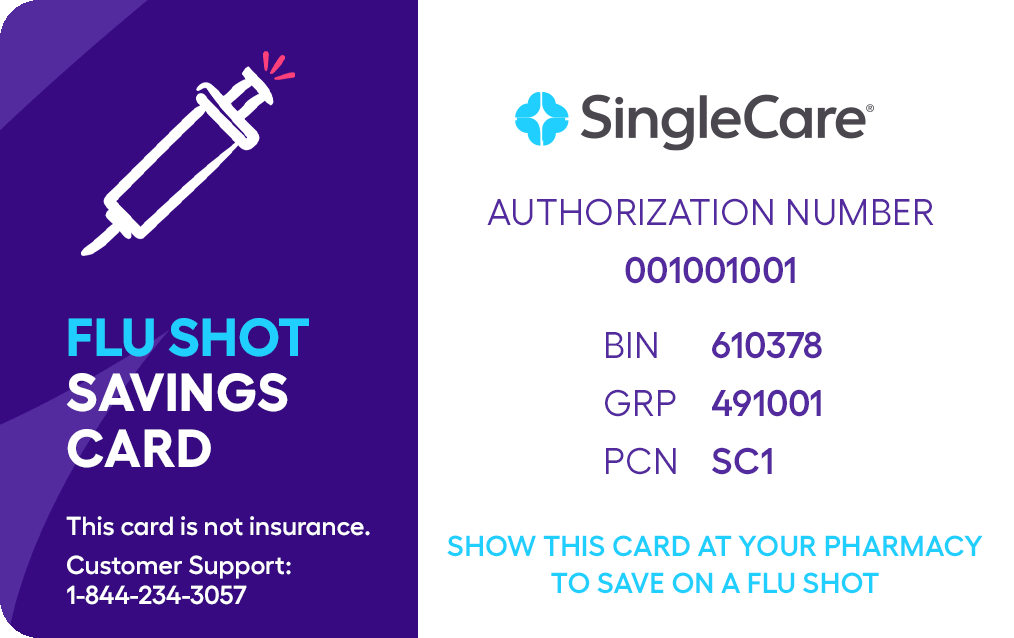Key takeaways
The flu shot is the most effective way to prevent influenza, a respiratory illness that peaks between December and March, and insurance plans are required to cover the cost with no copay under the Affordable Care Act.
Without health insurance, the cost of a flu shot ranges from $30-$40, but many pharmacies, doctor’s offices, and local government agencies offer free or discounted flu shots.
Annual flu vaccination is recommended for most people over 6 months old, including pregnant individuals, to reduce the risk of illness, hospitalization, and death from the flu.
The CDC states it is safe to receive the flu shot alongside the COVID-19 vaccine, and getting vaccinated for both does not interfere with the effectiveness of either vaccine.
Cost of flu shot without insurance | How to get a discount | Free flu shots near me| FAQs
Influenza, commonly known as the flu, is a contagious sickness that affects the respiratory system—the nose, throat, and lungs—caused by influenza viruses. You can get the flu any time of year, but it’s most common during peak flu season: between December and March.
On average, 8% of the United States population gets the flu virus during flu season, between 140,000 and 710,000 people are hospitalized for complications from the flu, and anywhere from 12,000 to 79,000 die from the flu each year according to estimates from the Centers for Disease Control and Prevention (CDC).
The good news? You can avoid illness by getting an influenza vaccine, or “flu shot,” every year. It’s the most effective way to prevent the flu, according to the CDC. And with these tips, the flu shot doesn’t have to break the bank. There are many ways to get discounted or free flu shots in your community.
RELATED: Can pregnant women get a flu shot?
Are flu shots free?
Under the Affordable Care Act, the federal government requires insurance companies to cover flu vaccines with no deductible or copay. But check with your insurance provider first, because you may be required to get your shot at a specific location.
According to a report recently released by the U.S. Department of Health & Human Services, over 35 million Americans had health insurance in the fourth quarter of 2021, bringing the rate of those uninsured down to 8.8% for the full population. If you’re uninsured, the resources below can help you find a free or low-cost jab.
How much is the flu shot without insurance?
Without health insurance, the price typically ranges from $30-$40 for the Fluzone quadrivalent vaccine. However, there are many places where you can get free flu shots without insurance.
Where can I get free flu shots near me?
Check the list below, and go get a flu shot as soon as available (usually August or September) to avoid getting sick. You can also use Vaccine Finder (vaccinefinder.org) to locate a pharmacy, healthcare provider, health department, or clinic offering the flu shot near you.
Pharmacies and drugstores
Lots of local pharmacies—even within grocery or big box stores—offer free flu shots for people with insurance. Some even add an additional incentive, such as a store coupon with your immunization.
CVS (and CVS within Target stores)
CVS Pharmacy offers no-cost flu shots with most insurance plans; many years they offer a $5 coupon to use on qualifying purchases in the store to encourage patrons to get vaccinated.
Kinney Drugs offers free flu shots with most insurance plans.
Get your flu shot at H-E-B with no appointment required, and flexible payment plans if it’s not covered by your insurance.
Meijer offers a wide range of CDC-recommended vaccinations, including the annual flu vaccine. Just bring your insurance information.
Get a flu shot for $0 copay with most insurance companies.
With any covered insurance plan, or VA-enrollment, flu shots are no cost to you at Walgreens. You can also receive a free vaccine at Walgreens—regardless of your insurance status. SingleCare has secured a limited number of free vaccine vouchers at the pharmacy chain. You can claim one by calling your local 211 starting early September (while supplies last).
Walmart pharmacies offer free flu vaccines with participating insurance plans.
No prescription or appointment needed. Just walk in, and get your flu shot for free with most insurance plans.
If your local pharmacy isn’t listed, don’t worry. Many others offer similar benefits, just ask your pharmacist. And don’t forget about the pharmacies within major grocery store chains.
RELATED: What you should know about getting vaccinated at the pharmacy
Doctor’s offices
Many people who get vaccinated get their flu shot at their doctor’s office. If you have insurance—including Medicare and Medicaid—the flu shot is often completely covered with no out-of-pocket cost if your primary care doctor is in-network. Some offices have open vaccination hours at the beginning or end of the business day with no extra charge. At other healthcare providers, you will have to schedule an appointment and—depending on your coverage—pay a copay for the visit. Check with your insurance and doctor’s office to understand the costs you could incur. When you call, make sure they have the current year’s flu vaccine, in the form and dose you need, in stock.
Urgent care centers
It can be hard to make it to the doctor’s office during normal business hours. If you can’t make it between 9 to 5, urgent care clinics offer extended hours. And many have walk-in slots for free flu shots, if you have insurance. Just like your doctor’s office, call ahead to make sure you won’t run into any surprise fees.
At work
Every year, workers across the U.S. miss approximately 111 million workdays from the flu, according to the National Institute for Occupational Safety and Health (NIOSH). It’s common for corporate offices to host free vaccine days to keep their employees from getting sick, and offset some of the $7 billion in estimated annual costs from paid time off and lost productivity. Ask your human resources department to see what’s available—but be aware that in 2022, companies may not offer this if most employees are working remotely.
Local government agencies
City or county health departments typically offer free flu shots for higher risk populations, like young children or senior citizens, either in the form of vouchers for uninsured patients or via free flu shot clinics that accept insurance. Some have extended coverage to all residents to protect public health. Check your local county’s website for details.
College campuses
A national survey found that less than half of college students get the flu vaccination, and the small living spaces and shared bathrooms in dorms put them at risk for catching it easily. College health centers commonly offer the vaccine to students for free to stave off a campus epidemic.
How to get a discount on your flu shot
If you can’t secure a free flu shot, make sure to compare prices at singlecare.com before choosing where to get your jab. You can find the least expensive location near you—plus, you’ll see coupons to save on flu shots, flu medications, and other prescriptions you need to get you through cold and flu season.
If it’s your first time using your SingleCare card, you can use a coupon for an additional $3 off the price of the following brands.
| Brand name | Get coupon |
| Afluria | Get coupon |
| Fluad | Get coupon |
| Fluarix | Get coupon |
| Flublok | Get coupon |
| Flucelvax | Get coupon |
| FluLaval | Get coupon |
| FluMist | Get Rx card |
| Fluzone | Get coupon |
RELATED: What is Afluria? | What is Fluad? | What is Fluarix? | What is Flublok? | What is Flucelvax? | What is FluLaval? | What is Fluzone?
You can use our free flu shot coupons for the whole family. SingleCare is accepted at thousands of pharmacies including CVS, Walgreens, Walmart, and more. Find a pharmacy near you that accepts SingleCare coupons here.
Flu shot FAQs
Why get a flu shot?
Getting a flu vaccination can keep you from getting sick with the flu. And if you do get the flu, having been vaccinated can decrease the severity of your illness. Flu shots also reduce your risk of hospitalization and death from the flu—this is particularly helpful for older adults and high risk individuals with existing health conditions.
Is the flu shot safe?
In the last 50 years, hundreds of millions of Americans have safely received the flu shot. The flu shot reduces your chances of catching the flu and spreading it to others. Common side effects include soreness, redness or swelling at the injection site, headache, nausea, and muscle and body aches.
When should I get a flu shot?
It’s best to get a flu shot in September or October. It can still be beneficial to receive later in the season, but you have a higher chance of being exposed before the shot can become effective. In other words, don’t wait too long!
Who should get a flu shot?
The CDC recommends an annual flu shot for most people 6 months of age and older, including pregnant people. If you’ve ever had a severe allergic reaction to the flu shot, you have an egg allergy, a history of Guillain-Barré Syndrome, or you are feeling unwell, talk to your provider before you get a flu shot.
What are the different types of flu shots?
The CDC recommends any licensed, age-appropriate flu vaccine without preference for one over the other—including injectable vaccines and nasal spray vaccines. However, the CDC recommends that adults 65 years and older get an injectable vaccine, and high-dose formulations are available for this age group.
It’s important to note that there are two types of flu vaccinations: trivalent and quadrivalent. Trivalent vaccines protect against 2 strains of influenza A and 1 strain of influenza B, whereas quadrivalent vaccines protect against 2 strains of influenza A and 2 strains of influenza B. All of the flu vaccines in the 2021-2022 season are of the quadrivalent variety, and are safe for individuals over 6 months of age with a few exceptions.
Can you get the flu shot at the same time as a COVID-19 vaccine?
Although data on receiving the COVID vaccine at the same time as the influenza vaccine is limited, the CDC advises that it’s safe to do so. Research is ongoing, but one study among healthcare workers found that the flu shot offered some protection against severe forms of COVID-19. But because they are two different viruses, you should be vaccinated against each one to be fully protected. Getting the flu shot will not interfere with the effects of the COVID-19 vaccine, and you don’t have to disclose whether you’ve been vaccinated for COVID-19 if you don’t want to.
In the instance that you’re experiencing flu symptoms or you’ve tested positive for COVID-19, you should wait until recovering and completing your isolation period before getting a flu or COVID-19 shot. For mild symptoms and a negative COVID-19 test, it’s okay to go ahead and get vaccinated for the flu or COVID-19.






